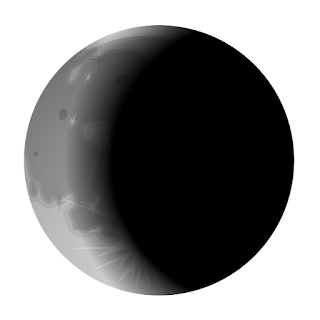"MAN [going towards steps]. Well, good-night, comrade, and thank you. You did me a good turn to-night, and I'm obliged to you. Maybe I'll be able to do as much for you when the small rise up and the big fall down . . . when we all change places at the rising [waves his hand and disappears] of the Moon."-The Rising of the Moon
The Rising of the Moon by Lady Gregory is a play concerning patriotism and struggle for freedom in the background of Ireland political history involving two characters- one the disguised ballad singer and the other the sergeant in search of a run away prisoner. The Rising of the Moon carries a title well chosen from a popular ballad for the Irish Revolutionary who would relay round at the precise moment for same undertaking. Fenian poet John Keegan Casey composed his well known ballad with the following lines:
“Who would follow in their footsteps at the Rising of the moon”
Here moon symbolizes freedom or urge for freedom. Gregory symbolically suggests the moon with the combined spirits of revolutionary in the Irish freedom movement. In fact, the Ragged man, the disguised ballad singer, is no other than the escaped freedom fighter and he is willing to have a change in the political history of Ireland. At the end of the play the Ragged man says to the sergeant, “when we all change places at the rising of the moon”. The implied meaning is that the Irish people would register freedom denying the oppressor British in near future.
We can have a ready reference to Granuaile one of the Irish rebels who fought a brave battle and well memorized Irish freedom rebels who were active and did underground works for the Irish way to freedom.
The play also exposes the emotional weakness the sergeant for his motherland. The Ragged man succeeds in bringing out the patriotic zeal and qualities of the sergeant. The Ragged man persuades him to share a common cause and the sergeant gets ready even to ignore the reword, prospects of promotion and duties of a police man. At the end a true Irish and patriot is given birth - a friend of Granuaile. So in a nutshell, The Rising of the Moon by Lady Gregory has ample implication of being a patriotic drama and she, in fact, voices for the common cause of Ireland, similarly as Dinabandhu Mitra's NilDarpan (The Mirror of Indigo) portrays the Indian cause of patriotism. One can also remind the scene from Pather Dabi (Demand of the Pathway) by Sarat Chandra Chattapadhya where in similar account the rebel patriot escape to Burma.
Ardhendu De


Comments
Post a Comment
Drop any query, suggestion or comment here.